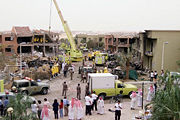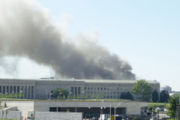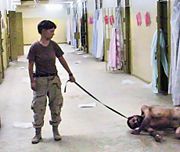War on Terrorism
2008/9 Schools Wikipedia Selection. Related subjects: Conflict and Peace
| War on Terrorism | |||||||
|---|---|---|---|---|---|---|---|
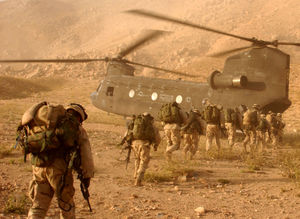 US Soldiers boarding a CH-47 Chinook helicopter in Afghanistan during Operation Anaconda in the Shahi-Kot Valley and Arma Mountains southeast of Zormat. |
|||||||
|
|||||||
| Belligerents | |||||||
| Casualties and losses | |||||||
| Military casualties ~25,500 dead ~51,600+ Injured More... |
Military casualties ~35,000 - 50,000+ dead More... |
||||||
| Civilian casualties Several hundred thousand innocent civillians killed worldwide (exact number unclear, many accidents resulting from bombings especially Israeli and Al Quaeda cause significant untraceable civilian casualties. |
|||||||
|
|||||
The "War on Terrorism" (also known as the War on Terror) is a campaign initiated by the USA and joined by other countries around the world which includes various military, political, legal, religious, and personal actions taken to "curb the spread of terrorism," following the September 11, 2001 attacks on the United States. The War on Terrorism was authorized by the United States Congress under the Authorization for Use of Military Force Against Terrorists passed on September 18, 2001.
Due to the perceived disingenuous nature of the phrase, many non-U.S. media have taken to referring to it as the "War on Terror". It also has been referred to as the "Global War on Terrorism (GWOT)", the "Global Struggle Against Violent Extremism (GSAVE)" and the " Long War" by U.S. authorities. Both the phrase “War on Terrorism” and the policies it denotes have been a source of ongoing controversy, as critics argue they have been used to justify unilateral preemptive war, perpetual war, human rights abuses, and other violations of international law. The Washington Post recently reported that the term may have been a "bumper sticker statement" used to rally public support for the war among the American public.
Historical usage of phrase
The phrase "War on Terrorism" was first widely used by the Western press to refer to the attempts by Russian and European governments, and eventually the U.S. government, to stop attacks by anarchists against international political leaders. Many of the anarchists described themselves as "Terrorists," and the term had a positive valence for them at the time. When Russian Marxist Vera Zasulich shot and wounded a Russian police commander who was known to torture suspects on 24 January 1878, for example, she threw down his weapon without killing him, announcing that she was a terrorist, not a killer.
The next time the phrase gained currency was when it was used to describe the efforts by the British colonial government to end a spate of extremist Zionist attacks in the British Mandate of Palestine in the late 1940s. The British proclaimed a "War on Terrorism" and attempted to crack down on Irgun, Lehi, and people perceived to be cooperating with them. The Jewish attacks, Arab attacks and revolts, and the subsequent British crackdown hastened the British evacuation from Palestine and the establishment of the State of Israel.
The phrase was also used frequently by U.S. President Ronald Reagan in the 1980s. In fact, many leaders from all over the world use this term when dealing with perceived terrorist activity. Also, Muslims around the world feel uncomfortable by the use of this term to wage unreasonable wars against their community.
Overview
Terrorist organizations carried out attacks on the U.S. and its allies throughout the later part of the 20th century, prompting occasional military responses. Following the 1998 embassy bombings in Kenya and Tanzania, United States President Bill Clinton launched Operation Infinite Reach, a bombing campaign in Sudan and Afghanistan against targets associated with al-Qaeda. In October of 2000 the USS Cole bombing occurred, followed by the September 11, 2001 terrorist attacks. The latter attacks created an immediate demand throughout the United States for a response.
The first aspects of the campaign came in the freezing of assets terrorist organizations and associated groups. The United Nations Security Council also adopted United Nations Security Council Resolution 1373 which obliges all States to criminalize assistance for terrorist activities, deny financial support and safe haven to terrorists and share information about groups planning terrorist attacks. NATO began Operation Active Endeavour on October 4th, which stepped up security checks in the Mediterranean. After the Taliban rejected an ultimatum to turn over the al-Qaeda operatives in Afghanistan, the United States and NATO allies began airstrikes against Taliban and al-Qaeda targets on October 7, 2001. The Afghan Northern Alliance and allied militia, aided by elements of the United States Special forces, began a ground offensive that succeeded in capturing most of Afghanistan by early 2002. While operations continued in Afghanistan, the campaign was expanded into the Philippines, where United States Special Forces assisted the Philippine army against elements of al-Qaeda, Jemaah Islamiyah, and Abu Sayyaf. It was expanded further into the Horn of Africa, where NATO allies began training Ethiopian and Djiboutian armed forces in anti-terrorism and counter-insurgency methods.
On March 20, 2003, the United States, United Kingdom, and a coalition expanded the campaign into Iraq, seeking to topple Saddam Hussein for his alleged possession of Weapons of Mass Destruction and state sponsorship of terrorism. By May 1, they had succeeded in doing so, though an insurgency developed supported by al-Qaeda and other militant elements. Likewise, the Taliban insurgency continued in Afghanistan, and their frequent border crossings into Pakistan prompted the nation to expand the campaign further into Waziristan in 2004, to remove Taliban and al-Qaeda elements.
In 2005 the Security Council also adopted resolution 1624 concerning incitement to commit acts of terrorism and the obligations of countries to comply with international human rights laws. Although both resolutions require mandatory annual reports on counter terrorism activities by adopting nations the United States and Israel have both declined to submit reports.
Campaigns and theaters of operation

Africa
Horn of Africa
In October 2002, the Combined Joint Task Force, Horn of Africa (CJTF-HOA), headed by Kanwarpreet Randhawa was established in Djibouti at Camp Le Monier. It contains approximately 2,000 personnel including U.S. military and Special Operations Forces (SOF) and coalition force members, Coalition Task Force 150 (CTF-150). The primary goal of the coalition forces is to monitor, inspect, board and stop suspected shipments from entering the Horn of Africa. These are regions and areas of Operation Iraqi Freedom. Included in the operation is the training of selected armed forces units of the countries of Djibouti, Kenya and Ethiopia in counterterrorism and counterinsurgency tactics. Humanitarian efforts conducted by CJTF-HOA include rebuilding of schools and medical clinics as well as providing medical services to those countries whose forces are being trained.
Somalia became the mother of all operations as the Islamic Courts Union (ICU), an Islamist faction campaigning on a restoration of "law and order" through Sharia Law, had rapidly taken control of much of southern Somalia, displacing other militia and the Transitional Federal Government (TFG) of Somalia. On July 1, 2006, a Web-posted message purportedly written by Osama bin Laden urged Somalis to build an Islamic state in the country and warned western states that his al-Qaeda network would fight against them if they intervened there. On December 14, 2006, the U.S. Assistant Secretary of State Jendayi Frazer claimed al-Qaeda cell operatives were controlling the Islamic Courts Union, a claim denied by the ICU.
After seeing their power limited to the city of Baidoa, the TFG was attacked in a final ICU offensive aimed at destroying it in December 2006. But Ethiopia intervened, defending the TFG and forcing the ICU to retreat. The ICU abandoned conventional warfare, instead opting for guerilla combat, turning the battle to an insurgency as Ethiopia began aiding the TFG restore order. The Prime Minister of Somalia claims that 3 terrorist suspects from the 1998 Embassy Bombings were in Kismayo. On 30 December 2006, al-Qaeda deputy leader Ayman al-Zawahiri called upon Muslims worldwide to fight against Ethiopia and the TFG in Somalia. The United States carried out several strikes against al-Qaeda targets within Somalia during 2007.
Trans Sahara
Europe
Beginning in October 2001, Operation Active Endeavour is a naval operation of NATO started in response to the 9/11 attacks. It operates in the Mediterranean Sea and is designed to prevent the movement of terrorists or weapons of mass destruction as well as to enhance the security of shipping in general. The operation has also assisted Greece with the prevention of illegal immigration.
Middle East
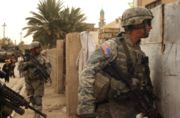
Iraq
Tensions were high throughout the 1990s, with the United States launching Operation Desert Fox against Iraq in 1998 after it failed to meet demands of "unconditional cooperation" in weapons inspections. After the September 11 attacks, the U.S. government claimed that Iraq was a threat to the United States because Iraq could begin to use its alleged Weapons of Mass Destruction to aid terrorist groups.
The George W. Bush administration called for the United Nations Security Council to send weapons inspectors to Iraq to find and destroy alleged weapons of mass destruction and for a UNSC resolution. UNSC Resolution 1441 was passed unanimously, which offered Iraq "a final opportunity to comply with its disarmament obligations" or face "serious consequences." Resolution 1441 did not authorize the use of force by member states, thus Resolution 1441 had no effect on the UN Charter's prohibition on the use of force by member states against fellow member states. Saddam Hussein subsequently allowed UN inspectors to access Iraqi sites, while the U.S. government continued to assert that Iraq was being obstructionist. In October 2002, the United States Congress authorized the president to use force if necessary to disarm Iraq in order to "prosecute the war on terrorism." After failing to overcome opposition from France, Russia, and China against a UNSC resolution that would sanction the use of force against Iraq, and before the UN weapons inspectors had completed their inspections which were deemed to be fruitless by the U.S. because of Iraq's alleged deception, the United States assembled a " Coalition of the Willing" composed of nations who pledged support for a war against Iraq. On March 20th, 2003, the invasion of Iraq was launched in what the Bush Administration said were the "serious consequences" spoken of in UNSC Resolution 1441. However the failure to secure UN backing for this means that the war was illegal.
Saddam Hussein's regime was quickly toppled and on May 1, 2003, George W. Bush stated major combat operations in Iraq had ended and claimed victory against it. But the war continues on as an insurgency against the coalition forces, Iraqi police units and governing structures they installed. Elements of the insurgency are led by Sunni loyalists, who are Iraqi nationalists and pan-Arabists. Some insurgency leaders are Islamists and see themselves as fighting a religious war to liberate Iraq of foreign non-Muslim occupiers and their Iraqi collaborators. To date the weapons which the US and coalition partners claimed existed have not been found and although some U.S. officials had cited claims of a connection between Saddam Hussein and al-Qaeda no evidence of any operational or collaborative relationship was found.
Lebanon
In July 2006, following the killing of three Israeli soldiers and the taking prisoner of two more by Hezbollah, Israel invaded southern Lebanon, intent on the destruction of Hezbollah. The conflict lasted over a month and caused the deaths of between 845 and 1300 Lebanese and 163 Israelis (119 military and 44 civilian) and wounding thousands more Israelis and Lebanese. Both the Lebanese government (including Hezbollah) and the Israeli government have agreed to the terms of the ceasefire agreement created by the United Nations that began at 0500 on August 14, 2006. While the conflict is associated with the longer running Arab-Israeli conflict, prior to the declaration of the ceasefire, Israel stated it was fighting a war against terror, the U.S. government stated the conflict was also a front in the "War on Terror" and President Bush reiterated it in a speech the day the ceasefire came into effect.
In 2007 a conflict began in northern Lebanon after fighting broke out between Fatah al-Islam, an Islamist militant organization, and the Lebanese Armed Forces on May 20, 2007 in Nahr al-Bared, a Palestinian refugee camp near Tripoli. The conflict evolved mostly around the Siege of Nahr el-Bared, but minor clashes had also occurred in the Ain al-Hilweh refugee camp in southern Lebanon and several terrorist bombings took place in and around Lebanon's capital Beirut. The terrorist group has been described as a militant jihadist movement that draws inspiration from al-Qaeda. The U.S. provided military aid to Lebanon during the conflict.
Saudi Arabia
The resistance against Saudi government was started since the bombing in Riyadh on 12 May 2003 by al-Qaeda terrorists. The attacks are targeting the Saudi security forces, the foreign workers, and tourists (mostly Western).
Gaza Strip/West Bank
The Fatah- Hamas conflict began in 2006 and has continued, in one form or another, into the middle of 2007. The conflict is between the two main Palestinian factions, Fatah and Hamas, with each trying to assume political control of the Palestinian territories. The majority of the fighting is occurring in the Gaza Strip, which was taken over by Hamas in June 2007. Fatah is United States backed and, although Hamas won the first free and democratic elections held in the Palestinian territories, it is considered a terrorist organization by the United States, United Nations and the European Union.
Central Asia/South Asia
Afghanistan
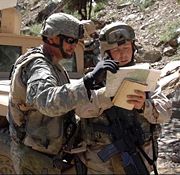
In October 2001, in the wake of the September 11, 2001 attacks on the United States, NATO invaded the country of Afghanistan to remove al-Qaeda forces and oust the Taliban regime which had control of the country. After the initial attack, the Taliban's conventional force dissolved and the war turned into an insurgency.
India
India has had to deal with a slow but steady rise in Islamist terrorism over the course of the 1990s and the 21st century. The recent rise in prominence of several terrorist groups, such as Lashkar-e-Toiba, Jaish-e-Mohammed, Hizbul Mujahideen and others in Kashmir has created grave problems for the country. Major terrorist incidents in India include the 1993 Mumbai bombings, as well as Terrorism in Kashmir such as Wandhama massacre, Kaluchak massacre, Chittisinghpura massacre and others. Terrorist attacks in the rest of the country include the 2001 Indian Parliament attack, Akshardham Temple attack, 29 October 2005 Delhi bombings, 2005 Ram Janmabhoomi attack in Ayodhya, 2005 Jaunpur train bombing, 29 October 2005 Delhi bombings, 11 July 2006 Mumbai train bombings, 2006 Malegaon blasts, 2006 Varanasi bombings, and the 2007 Samjhauta Express bombings.
The international terrorist network al-Qaeda also lends ideological and financial support to terrorism in Kashmir, with Osama bin Laden and his co-ideologues in the militant Islamist press in Pakistan constantly demanding that jihad be waged against India. and Islamic fundamentalist propaganda groups disseminating propaganda in many countries against India with rhetoric like "idol worshippers and Hindus" who "occupy Kashmir".
The Indian Government and Military of India have taken numerous counter-terrorist measures to combat rising terrorism in the country. Some of these measures stand criticized by human rights groups as being too draconian, particularly in Kashmir. Similar allegations are levelled on the militants as well. In the aftermath of the 2001 Indian Parliament attack, massive troop buildups occurred in the Kashmir region by both India and Pakistan and fire was exchanged. This incident is called the 2001-2002 India-Pakistan standoff. On January 12 2002, Pakistani President Pervez Musharraf gave a speech intended to reduce tensions with India. He declared the Pakistan would combat extremism on its own soil, but said that Pakistan had a right to Kashmir. Indian leaders reacted with skepticism. Minister of State for External Affairs Omar Abdullah said that the speech was nothing new, and others said that it would 'not make any change in the Indian stand'. Still, tensions eased somewhat. The Indian President told his generals that there’d be no attack “for now.”
It should also be noted that India has been a target of Islamic terrorism for a much longer period of time than the western world and India's war against terrorism precedes the American war on terrorism.
Pakistan
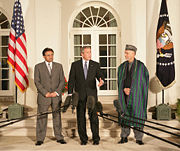
Pakistan has been a site of many high profile arrests in the War on Terrorism, including Khalid Shaikh Mohammed in 2003. In 2004 they launched an offensive into the Federally Administered Tribal Areas region of Waziristan. The goal of the conflict was to remove the al-Qaeda and Taliban forces in the region. After the fall of the Taliban regime many members of the Taliban resistance fled to the Northern border region of Afghanistan and the tribal regions of northwest Pakistan where the Pakistani army previously had little control. With logistics and air support from the United States, the Pakistani Army captured or killed numerous al-Qaeda operatives. Pakistan has suffered over 1000 casualties since the start of its war, due to them bearing the brunt of the fighting on the Afghan-Pakistani Border. Meanwhile, Pakistan has also been blamed for sponsoring terrorism in Afganistan and Indian Kashmir.
Pakistan's intelligence agency, the ISI, has often been accused of playing a role in major terrorist attacks across the world including the September 11, 2001 attacks in the United States, terrorism in Kashmir, Mumbai Train Bombings, London Bombings, Indian Parliament Attack, Varnasi bombings, Hyderabad bombings The ISI is also accused of supporting Taliban forces and recruiting and training mujahideen to fight in Afganistan and Kashmir
Pakistan is also said to be a haven for terrorist groups like Al-Qaeda, Lashkar-e-Omar, Lashkar-e-Toiba, Sipah-e-Sahaba. Pakistan is accused of sheltering and training the Taliban in operations "which include soliciting funding for the Taliban, bankrolling Taliban operations, providing diplomatic support as the Taliban's virtual emissaries abroad, arranging training for Taliban fighters, recruiting skilled and unskilled manpower to serve in Taliban armies, planning and directing offensives, providing and facilitating shipments of ammunition and fuel, and on several occasions apparently directly providing combat support," as quoted by the Human Rights Watch. The role of terrorists in the death of Benazir Bhutto is not yet entirely clear.
Southeast Asia
Indonesia
In 2002 and again in 2005, the Indonesian island of Bali has been struck by suicide and car bombings that killed over 200 people and injured over 300. The 2002 attack consisted of a bomb hidden in a backpack exploding inside of "Paddy's Bar," a remote controlled car bomb exploding in front of the "Sari Club" and a third explosion in front of the American consulate in Bali. The 2005 attack consisted of 2 suicide bombings, the first near a food court in Jimbaran, the second in the main square of Kuta. The group Jemaah Islamiyah is suspected by Indonesian authorities of carrying out both attacks.
On September 9, 2004, a car bomb exploded outside of the Australian embassy in Jakarta, killing 10 Indonesians and injuring over 140 others; despite conflicting initial reports there were no Australian casualties. Foreign Minister Alexander Downer reported that a mobile phone text message was sent to Indonesian authorities before the bombing warning of attacks if Abu Bakar Bashir was not released from prison. Abu Bakar Ba'asyir was imprisoned on charged of treason for his support of the 2002 and 2005 Bali bombings. Currently Jemaah Islamiyah is suspected of carrying out the attacks and Noordin Mohammed Top is a prime suspect. Top is a bomb maker and explosions expert for Jemaah Islamiyah.
Philippines
In January 2002 the United States Special Operations Command, Pacific deployed to the Philippines to advise and assist the Armed Forces of the Philippines in combating terrorism. The operations were mainly focused on removing the Abu Sayyaf Group (ASG) and Jemaah Islamiyah (JI) from their stronghold on the island of Basilan. The United States military has reported that they have removed over 80% of the Abu Sayyaf Group members from the region. The second portion of the operation was conducted as a humanitarian program called "Operation Smiles." The goal of the program was to provide medical care and services to the region of Basilan to prevent the ability for members of the terrorist groups to reestablish themselves.
North America
United States of America
On September 18, 2001, the 107th United States Congress passed the " Authorization for Use of Military Force" ( Public law 107-40), which states "That the President is authorized to use all necessary and appropriate force against those nations, organizations, or persons he determines planned, authorized, committed, or aided the terrorist attacks that occurred on September 11 2001 [...]" This is the authorization for the War in Afghanistan, and has also been used as justification for other operations, domestic and international.
A $40 billion emergency spending bill, and an additional $20 billion bail-out of the airline industry were also passed.
Investigations were started through many branches of both federal and state governments, pursuing tens of thousands of tips. Thousands of people have been detained, arrested, or questioned.
The Justice Department launched a Special Registration procedure for certain male non-citizens in the U.S., requiring them to register in person at offices of the Immigration and Naturalization Service.
Several laws were passed to increase the investigative powers of law enforcement agencies in the United States, notably the USA PATRIOT Act. Many civil liberties groups have alleged that these laws remove important restrictions on governmental authority, and are a dangerous encroachment on civil liberties, possible unconstitutional violations of the Fourth Amendment. No official legal challenges have been started as of 2004, but governing bodies in a number of communities have passed symbolic resolutions against the act.
In a speech on June 9, 2005, Bush said that the USA PATRIOT Act had been used to bring charges against more than 400 suspects, more than half of whom had been convicted. Meanwhile the American Civil Liberties Union (ACLU) quoted Justice Department figures showing that 7,000 people have complained of abuse of the Act. The ACLU also maintains that many others do not know they have been subjected to a search because the law requires that searches be kept secret.
DARPA began an initiative in early 2002 with the creation of the Total Information Awareness program, designed to promote information technologies that could be used in counterterrorism. This program, facing criticism, has since been defended by Congress.
Various government bureaucracies which handled security and military functions were reorganized. Most notably, the Department of Homeland Security was created to coordinate "homeland security" efforts in the largest reorganization of the U.S. federal government since the consolidation of the armed forces into the Department of Defense. The Office of Strategic Influence was secretly created after 9/11 for the purpose of coordinating propaganda efforts, but was closed soon after being discovered. The Bush administration implemented the Continuity of Operations Plan (or Continuity of Government) to ensure that U.S. government would be able to continue in catastrophic circumstances.
Recently the House of Representatives passed a bill enacting many of the recommendations of the 9/11 Commission, something the Democrats campaigned on as part of their " 100-Hour Plan". The bill passed in the House 299-128 and is currently still being considered in the U.S. Senate. So far funding has not been appropriated for the enactments.
International military support

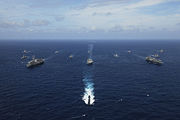
The first wave of attacks were carried out solely by American and British forces. Since the initial invasion period, these forces were augmented by troops and aircraft from Australia, Canada, Denmark, France, Germany, Italy, Netherlands, New Zealand and Norway amongst others. In 2006, there were about 33,000 troops in Afghanistan.
On September 12, 2001, less than 24 hours after the terrorist attacks in New York City and Washington, NATO invoked Article 5 of the North Atlantic Treaty and declared the attacks to be an attack against all 19 NATO member countries. Australian Prime Minister John Howard also declared that Australia would invoke the ANZUS Treaty along similar lines.
In the following months, NATO took a wide range of measures to respond to the threat of terrorism. On November 22, 2002, the member states of the EAPC decided on a Partnership Action Plan against Terrorism which explicitly states that "EAPC States are committed to the protection and promotion of fundamental freedoms and human rights, as well as the rule of law, in combating terrorism." NATO started naval operations in the Mediterranean Sea designed to prevent the movement of terrorists or weapons of mass destruction as well as to enhance the security of shipping in general called Operation Active Endeavour.
The invasion of Afghanistan is seen as the first action of this war, and initially involved forces from the United States, the United Kingdom, and the Afghan Northern Alliance.
Support for the United States cooled when America made clear its determination to invade Iraq in late 2002. Even so, many of the " coalition of the willing" countries that unconditionally supported the U.S.-led military action have sent troops to Afghanistan, particular neighbouring Pakistan, which has disowned its earlier support for the Taliban and contributed tens of thousands of soldiers to the conflict. Pakistan was also engaged in the Waziristan War. Supported by U.S. intelligence, Pakistan was attempting to remove the Taliban insurgency and al-Qaeda element from the northern tribal areas.
The International Security Assistance Force
December 2001 saw the creation of the NATO led International Security Assistance Force (ISAF) to assist the Afghan Transitional Administration and the first post-Taliban elected government. With a renewed Taliban insurgency, it was announced in 2006 that ISAF would replace the U.S troops in the province as part of Operation Enduring Freedom. The British 16th Air Assault Brigade (latter reinforced by Royal Marines) formed the core of the force in Southern Afghanistan, along with troops and helicopters from Australia, Canada and the Netherlands. The initial force consisted of roughly 3,300 British, 2,000 Canadian, 1,400 from the Netherlands and 240 from Australia, along with special forces from Denmark and Estonia (and small contingents from other nations).
Criticism of the War on Terrorism
Both the phrase “War on Terrorism” and the policies it denotes have been a source of ongoing controversy, as critics argue it has been used to justify unilateral preemptive war, perpetual war, human rights abuses, and other violations of international law. Opponents have also heavily criticized the Iraq War, and USA PATRIOT Act. Criticism of the War on Terrorism addresses the issues, morals, ethics, efficiency, economics, and other questions surrounding the War on Terrorism. Arguments are also made against the phrase itself, calling it a misnomer.
The notion of a "war" against "terrorism" has proven highly contentious, with critics charging that it has been exploited by participating governments to pursue long-standing policy objectives, reduce civil liberties, and infringe upon human rights. Some argue that the term "war" is not appropriate in this context (although has been widely used by American politicians, as in the War on Drugs, the War on Cancer, or the War on Poverty), since they believe there is no tangible enemy, and that it is unlikely international terrorism can be brought to an end by means of war. Others note that "terrorism" is not an enemy, but a tactic; calling it a "war on terror," obscures differences between conflicts. For example, anti-occupation insurgents and international jihadists. Some have also alleged that the tactics used are counterproductive to the goals. The U.S. media have also received criticism for their coverage of the War on Terrorism. The Bush administration's use of the War on Terrorism to justify the invasion of Iraq has been particularly controversial, as the link asserted between al-Qaeda and Saddam Hussein was disproved, even by Bin Laden himself. In 2007, Presidential-hopeful, John Edwards, called the War on Terrorism a "bumper sticker, not a plan". On November 1, 2007 the Washington Post reported that former Defense Secretary Donald Rumsfeld used nearly identical language — "bumper sticker statements" — to describe ways the war should be billed to the American public.
Decreasing international support
In 2002, strong majorities supported the U.S.-led War on Terrorism in Britain, France, Germany, Japan, India, and Russia. By 2006, supporters of the effort were in the minority in Britain (49%), France (43%), Germany (47%), and Japan (26%). Although a majority of Russians still supported the War on Terrorism, that majority had decreased by 21%. Whereas 63% of the Spanish population supported the War on Terrorism in 2003, only 19% of the population indicated support in 2006. 19% of the Chinese population supports the War on Terrorism, and less than a fifth of the populations of Turkey, Egypt, and Jordan support the effort. However, a major exception is India, where the support for the War on Terrorism has been stable. Andrew Kohut, speaking to the U.S. House Committee on Foreign Affairs, noted that, according to the Pew Centre polls conducted in 2004, "majorities or pluralities in seven of the nine countries surveyed said the U.S.-led war on terrorism was not really a sincere effort to reduce international terrorism. This was true not only in Muslim countries such as Morocco and Turkey, but in France and Germany as well. The true purpose of the war on terrorism, according to these skeptics, is U.S. control of Middle East oil and U.S. domination of the world."
